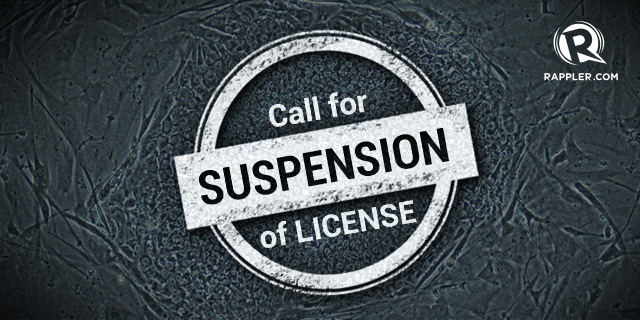SUMMARY
This is AI generated summarization, which may have errors. For context, always refer to the full article.

In a press conference held Tuesday, July 30, the PCP accused doctors — who do stem cell transplants that have no “proven indications” — of misleading the public. Proven indications refer to a clearly indicated therapeutic purpose backed up by a proper clinical trial.
“Sana maging effective sila in the future. But like any other drug, kaillangan may pagdaanang proseso (I hope they become effective in the future. But like any other drug, they need to go through a process),” said PCP vice-president Dr Anthony Leachon.
Stem cell therapy or regenerative medicine is a medical intervention that uses the body’s repair cells to replace old cells. It became controversial in the country after 3 politicians died allegedly due to botched treatments performed abroad.
‘PRC should intervene’
The physicians’ group urged the Professional Regulatory Commission (PRC) to act on the matter, adding that the “unethical” practice of using drugs that have yet to go through a clinical trial takes advantage of the misery of ailing Filipinos.
Dr Leachon said treatment prices range from half a million pesos to P4-million, a price even middle-income families would be willing to pay to save a dying relative.
Leachon shared an account of a family who sold their property to defray the costs of a P4-million stem cell treatment meant for liver cancer. The family already gave P100,000 to the physician as downpayment.
Philippine medical community
The PCP’s call came on the heels of reports that Philippine Medical Association (PMA) president Leo Olarte had claimed curative benefits of stem cell treatment for a range of diseases.
A report from The Philippine Star quoted Olarte as saying autologous or adult-sourced stem cell therapy has an “impeccable record in degenerative diseases, autism, dementia, Parkinsons, strokes, osteoarthritis, diabetes and a host of other ailments.”
The pronouncement was made when Olarte issued a public warning against animal-sourced stem cell therapies performed abroad.
Olarte is also the spokesman of the Philippine Society for Stem Cell Medicine (PSSCM).
The report also cited PSCCM’s intention to upgrade “medical tourism” in the country “anchored on stem cell or regenerative medicine.”
Proven medical benefits
The PCP, however, said during the media briefing that the only proven medical benefits of the clinical application involve cancers of the blood such as acute and chronic leukemia, as well as some primary immune-deficiencies like anemia.
Leachon of PCP later added that the Philippines has become a “dumping ground” of “basurang mga gamot (subpar drugs)” typically disapproved in countries abroad.
The PCP urged the Department of Health (DOH) through the Food and Drug Administration (FDA) to use its legal mandate to enforce stricter regulations.
On March 18, the DOH issued the rules and regulations for the accreditation of health facilities engaging in human stem cell and cell-based or cellular therapies in the Philippines.
READ: DOH: Stem cell therapy not curative yet
The FDA issued on Juy 8 a circular on the guidelines for the registration of stem cell-based products. It is the first attempt of government to regulate these products.
Clear indication empowers patients
In a previous interview, stem cell transplant physician Dr Florencio Lucero said the treatment is not curative but can help improve one’s condition.
WATCH: Stem cell therapy: Future of medicine?
Leachon, however, said that a medical product entering the market is always labelled with an indication (a clearly stated purpose of the drug) or a therapeutic endpoint.
Paper insertions in drug packets, for instance, provide patients with a reasonable expectation about the drug—what it is for and what it can cure. This way, drug manufacturers are held accountable for their claims.
Leachon said an indication as vague as “improved health condition” fails to satisfy this standard. It does not matter even if the patient is willing to pay for a medial benefit that is ambiguous.
In the context of a treatment such as stem cell therapy which involves the introduction of a product to the human body, and which is administered by a physician, an indication allows the patient to give informed consent.
Dr Antonio Dans of the Philippine Society of General Internal Medicine said physicians can rightfully claim results of “general well-being” if the treatments had gone through approved clinical trials with concrete measurements of “well-being.”
Leachon clarified they are not against stem cell treatments, but are only against those that are used for “unapproved indications.”
“The most expensive drug or treatment is the one that does not work,” he said, as there is no assured return from the money invested in the treatment. – Rappler.com
Add a comment
How does this make you feel?
There are no comments yet. Add your comment to start the conversation.